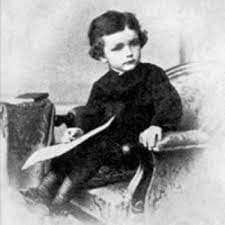
Richard Strauss as a kid
Richard Georg Strauss was born on 11 June 1864 as the first of two children of Franz Strauss and Josephine Pschorr. Franz was the principle horn player at the Court Opera in Munich, and a professor at the Royal Music School. In his day, he was recognized as a celebrated horn virtuoso and even Richard Wagner, against whom the musically conservative Strauss took literally every opportunity to make his disapproval clear, recognized his unusual talent. “Old Strauss is an unbearable fellow,” he writes, “but when he plays the horn one can’t really mind him.” To be sure, Franz Strauss, sometimes affectionately nicknamed the “Joachim of the horn,” set new standards on this instrument for well over four decades. Richard’s mother Josephine Pschorr was the daughter of Georg Pschorr, a wealthy brewer from Munich. Richard grew up in the heart of Munich, and he was able to capitalize on all that great city had to offer. One thing for sure, Richard was musically precocious.
Richard Strauss: Serenade for Winds in E-flat, Op. 7
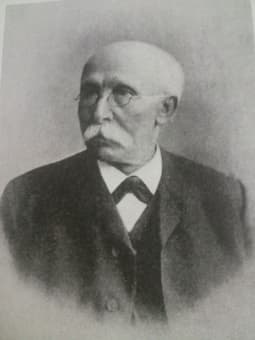
Franz Strauss
Richard started piano lessons at the age of four with the harpist in the court orchestra August Tombo. Before long he was able to play the tunes in a book of operatic arrangements, and successfully tackled a Mozart sonata. His older sister remembered, “Richard made swift progress. Sight-reading presented him with no problems. His teacher played to him a great deal, and there was one trick that delighted Richard. His teacher played the bass part with the left hand, the top line with his right hand and the middle part with the tip of his long pointed nose.” Richard first tried his hands at composition at the age of six, when he composed the Schneider-Polka (Tailor Polka) for piano. However, as he was not yet capable of writing music, his father wrote it down for him. By age eight he took violin lessons from his cousin Benno Walter, and at 11 began five years of compositional study with Friedrich Wilhelm Meyer.
Richard Strauss: String Quartet in A Major, Op. 2 (Lotus String Quartet, Stuttgart)
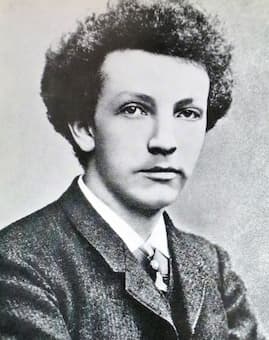
The young Richard Strauss
The most important musical influence on Richard’s musical education was his father. He taught him Mozart, Beethoven, and Schubert and as “late as the early 1880s Franz was still supervising his son’s compositions, making comments and criticism.” Another important youthful influence was Ludwig Thuille, who subsequently became a prominent composer, theorist and member of the Munich School. Thuille had been orphaned, and he was treated as one of the family in the Strauss home.
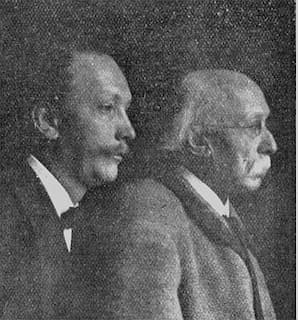
Richard and Franz Strauss
“Richard’s surviving letters to Thuille present something of a childhood diary, including reports on composing, music lessons and the works of other composers. We learn that the first time Richard heard a Beethoven symphony, he remained unmoved and even said, and “I didn’t care of it.” Nor did he understand Beethoven’s sonatas and quartets at that stage. In his piano lessons he preferred Chopin, Mendelssohn and Bach, and he made his pianistic debut on 20 October 1885 performing the Mozart C-minor Concerto with his own cadenzas, which are unfortunately lost.
Richard Strauss: Concerto for Horn and Orchestra No. 1, Op. 11
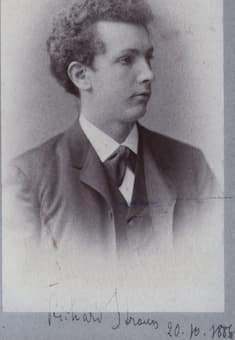 His earliest compositions consisted mostly of lieder, piano pieces and chamber music. As a teacher, “Meyer may have been unexceptional, but he nonetheless gave the young composer a thorough grounding in harmony, classical phraseology and form.” In turn, Meyer described Richard as “a student with excellent disposition, good deportment and well behaved; lively, enthusiastic, attentive, sometime over-eager and hasty.” When his father took over leadership of an amateur orchestra, Richard attended rehearsals and himself joined the ensemble as a violinist in 1882. He demonstrated an increasing interest in orchestral music, and learned orchestration on a practical level. In fact, he wrote some of his first orchestral pieces, including marches, concert overture and two symphonies. We can add to this the remarkable concertos for violin and for horn. At age 21, Richard Strauss took up the post of assistant conductor to Hans von Bülow at the Meiningen Orchestra. Bülow was a student of Franz Liszt who initially championed the music of Richard Wagner. However, when his wife, the Liszt daughter Cosima, left him for Wagner, he switched his alliance to the music of Brahms. To thank Bülow for his appointment, Strauss composed a work for piano and orchestra that entered the repertoire under the title Burleske.
His earliest compositions consisted mostly of lieder, piano pieces and chamber music. As a teacher, “Meyer may have been unexceptional, but he nonetheless gave the young composer a thorough grounding in harmony, classical phraseology and form.” In turn, Meyer described Richard as “a student with excellent disposition, good deportment and well behaved; lively, enthusiastic, attentive, sometime over-eager and hasty.” When his father took over leadership of an amateur orchestra, Richard attended rehearsals and himself joined the ensemble as a violinist in 1882. He demonstrated an increasing interest in orchestral music, and learned orchestration on a practical level. In fact, he wrote some of his first orchestral pieces, including marches, concert overture and two symphonies. We can add to this the remarkable concertos for violin and for horn. At age 21, Richard Strauss took up the post of assistant conductor to Hans von Bülow at the Meiningen Orchestra. Bülow was a student of Franz Liszt who initially championed the music of Richard Wagner. However, when his wife, the Liszt daughter Cosima, left him for Wagner, he switched his alliance to the music of Brahms. To thank Bülow for his appointment, Strauss composed a work for piano and orchestra that entered the repertoire under the title Burleske.
For more of the best in classical music, sign up to our E-Newsletter
Richard Strauss: Burleske

Interesting and didactic information Thank you.